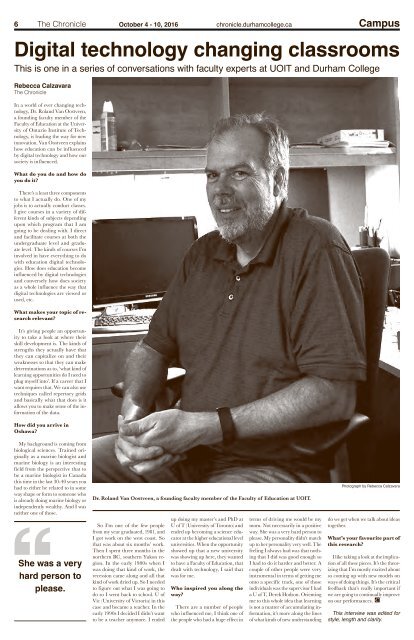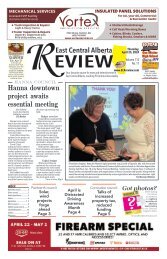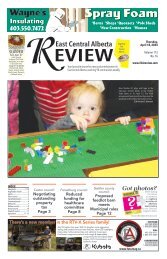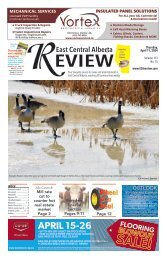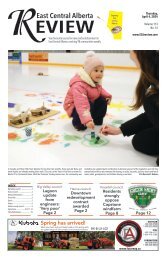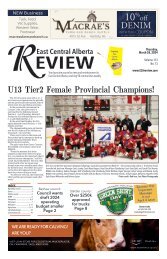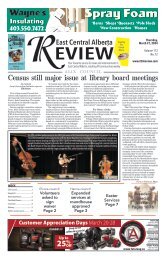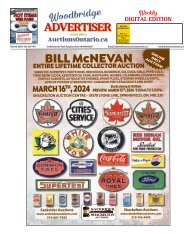Create successful ePaper yourself
Turn your PDF publications into a flip-book with our unique Google optimized e-Paper software.
6 The <strong>Chronicle</strong> October 4 - 10, 20<strong>16</strong> chronicle.durhamcollege.ca Campus<br />
Digital technology changing classrooms<br />
This is one in a series of conversations with faculty experts at UOIT and Durham College<br />
Rebecca Calzavara<br />
The <strong>Chronicle</strong><br />
In a world of ever changing technology,<br />
Dr. Roland Van Oostveen,<br />
a founding faculty member of the<br />
Faculty of Education at the University<br />
of Ontario Institute of Technology,<br />
is leading the way for new<br />
innovation. Van Oostveen explains<br />
how education can be influenced<br />
by digital technology and how our<br />
society is influenced.<br />
What do you do and how do<br />
you do it?<br />
There’s a least three components<br />
to what I actually do. One of my<br />
jobs is to actually conduct classes.<br />
I give courses in a variety of different<br />
kinds of subjects depending<br />
upon which program that I am<br />
going to be dealing with. I direct<br />
and facilitate courses at both the<br />
undergraduate level and graduate<br />
level. The kinds of courses I’m<br />
involved in have everything to do<br />
with education digital technologies.<br />
How does education become<br />
influenced by digital technologies<br />
and conversely how does society<br />
as a whole influence the way that<br />
digital technologies are viewed or<br />
used, etc.<br />
What makes your topic of research<br />
relevant?<br />
It’s giving people an opportunity<br />
to take a look at where their<br />
skill development is. The kinds of<br />
strengths they actually have that<br />
they can capitalize on and their<br />
weaknesses so that they can make<br />
determinations as to, ‘what kind of<br />
learning opportunities do I need to<br />
plug myself into’. If a career that I<br />
want requires that. We can also use<br />
techniques called repertory grids<br />
and basically what that does is it<br />
allows you to make sense of the information<br />
of the data.<br />
How did you arrive in<br />
Oshawa?<br />
My background is coming from<br />
biological sciences. Trained originally<br />
as a marine biologist and<br />
marine biology is an interesting<br />
field from the perspective that to<br />
be a marine biologist in Canada<br />
this time in the last 30-40 years you<br />
had to either be related to in some<br />
way shape or form to someone who<br />
is already doing marine biology or<br />
independently wealthy. And I was<br />
neither one of those.<br />
She was a very<br />
hard person to<br />
please.<br />
Dr. Roland Van Oostveen, a founding faculty member of the Faculty of Education at UOIT.<br />
So I’m one of the few people<br />
from my year graduated, 1981, and<br />
I got work on the west coast. So<br />
that was about six months’ work.<br />
Then I spent three months in the<br />
northern BC, southern Yukon region.<br />
In the early 1980s when I<br />
was doing that kind of work, the<br />
recession came along and all that<br />
kind of work dried up. So I needed<br />
to figure out what I was going to<br />
do so I went back to school. U of<br />
Vic (University of Victoria) in this<br />
case and became a teacher. In the<br />
early 1990s I decided I didn’t want<br />
to be a teacher anymore. I ended<br />
up doing my master’s and PhD at<br />
U of T (University of Toronto) and<br />
ended up becoming a science educator<br />
at the higher educational level<br />
universities. When the opportunity<br />
showed up that a new university<br />
was showing up here, they wanted<br />
to have a Faculty of Education, that<br />
dealt with technology, I said that<br />
was for me.<br />
Who inspired you along the<br />
way?<br />
There are a number of people<br />
who influenced me, I think one of<br />
the people who had a huge effect in<br />
terms of driving me would be my<br />
mom. Not necessarily in a positive<br />
way. She was a very hard person to<br />
please. My personality didn’t match<br />
up to her personality very well. The<br />
feeling I always had was that nothing<br />
that I did was good enough so<br />
I had to do it harder and better. A<br />
couple of other people were very<br />
instrumental in terms of getting me<br />
onto a specific track, one of those<br />
individuals was the supervisor I had<br />
a U of T, Derek Hodson. Orienting<br />
me to this whole idea that learning<br />
is not a matter of accumulating information,<br />
it’s more along the lines<br />
of what kinds of new understanding<br />
Photograph by Rebecca Calzavara<br />
do we get when we talk about ideas<br />
together.<br />
What’s your favourite part of<br />
this research?<br />
I like taking a look at the implication<br />
of all these pieces. It’s the theorizing<br />
that I’m mostly excited about<br />
so coming up with new models on<br />
ways of doing things. It’s the critical<br />
feedback that’s really important if<br />
we are going to continually improve<br />
on our performances.<br />
This interview was edited for<br />
style, length and clarity.<br />
page_06.indd 1<br />
20<strong>16</strong>-09-30 11:28 AM


